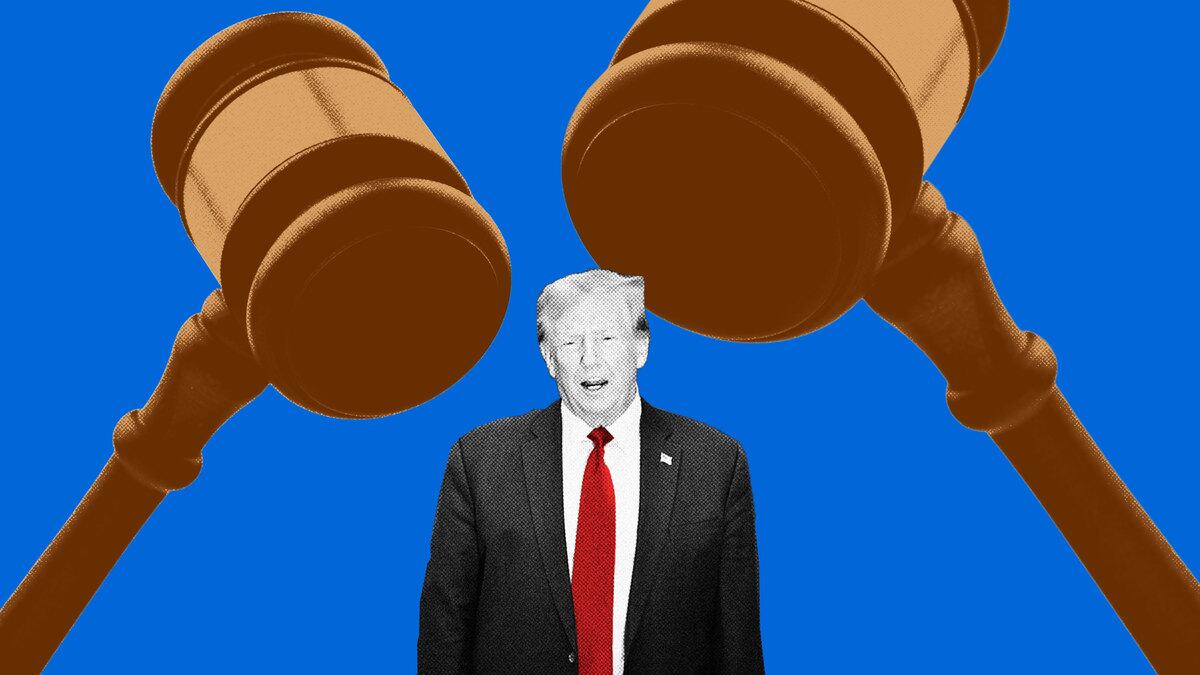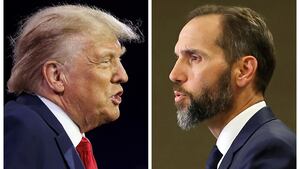It’s now entirely up to the Supreme Court whether former President Donald Trump will be spared an embarrassing and potentially devastating criminal trial just as the nation votes in key 2024 primary elections.
On Monday, Justice Department Special Counsel Jack Smith took the heart of his 2020 coup case against Trump straight to the nation’s highest court, skipping right over the mid-level appellate court in Washington. And just hours later, the Supreme Court agreed to take on the case.
But if the process appears to be moving at breakneck speed, not so fast. The slowdown could come quickly. Even this fast-track process could end up delaying the former president’s upcoming D.C. trial, the first of four that could brand him a felon before he potentially returns to the White House.
A review of similarly positioned cases shows that justices often take months to decide whether to take action on these types of rare legal battles.
Since the Supreme Court nearly a century ago first gained the authority to review pivotal and time-sensitive legal matters before a lower appellate court weighs in, it has done so only 50 times, according to records tracked down by law professor Stephen Vladeck and his research assistant David Merlinsky at the University of Texas at Austin.
Recent examples show that the present court usually takes longer than six months to move at its version of lightning speed when doing so.
On Twitter, Vladeck noted that “some of them… moved *very* quickly,” pointing to the current court’s recent decisions to strike down President Joe Biden’s student-loan forgiveness program and leave Texas’ six-week abortion ban in effect. For example, the abortion case took 84 days from the moment lawyers tried to get the highest court’s attention with a petition until a decision was rendered.
Others took much longer. The last four cases took 246 days on average, a review of court records shows. And much of that time is taken up by justices figuring things out even after lawyers present arguments in court.
The fifth most recent case, which only took 11 days, is something of an anomaly. It was a layup for conservative justices, who merely decided to temporarily keep Louisiana’s gerrymandered map in place.
But speed is relative.
With Trump’s election fraud case set to start March 4, and the screening of potential jurors set for Feb. 9, the Supreme Court at this point would have to hear the case over the holidays—and speed through one of the most historic decisions in modern history.
Still, the decision shouldn’t be that difficult, because the question is straightforward: Is an American president able to commit crimes while in office without ever facing criminal charges?
Any delay—even by a day—would seriously hamper one of the most significant aspects of Trump’s upcoming trial in Washington for lying to the American public in an attempt to stay in power. Days and hours matter because Trump’s D.C. trial is set to start the day before the massive primary election contests on Super Tuesday.
As it stands, the nation might finally hear federal prosecutors deliver the full summation of their criminal case against Trump just as Republican voters head to the polls in more than a dozen states, including California and Texas.

Former President and Republican presidential candidate Donald Trump rallies with supporters at a "commit to caucus" event at a Whiskey bar in Ankeny, Iowa.
Carlos Barria/ReutersIt’s terrible timing for Trump, who will be portrayed by seasoned prosecutors representing the U.S. government as a man who betrayed the very Constitution he swore to protect and defend. And it’s an unprecedented opportunity for Nikki Haley, Ron DeSantis, and the few other candidates desperately trying to replace him as the GOP frontrunner.
But U.S. District Judge Tanya Chutkan is unlikely to start what’s positioned to be the biggest courtroom showdown yet in American history if there’s a possibility the Supreme Court could decide that Trump, as a former president, can’t even face criminal charges.
It’s a question so fundamental to the very fabric of the nation that Smith described it in stark terms in his petition to the Supreme Court.
“A cornerstone of our constitutional order is that no person is above the law. The force of that principle is at its zenith where, as here, a grand jury has accused a former President of committing federal crimes to subvert the peaceful transfer of power to his lawfully elected successor. Nothing could be more vital to our democracy than that a President who abuses the electoral system to remain in office is held accountable for criminal conduct,” his prosecutors wrote in Monday’s filing.
Democrats and moderate Republicans have long feared this kind of high-stakes fight at the Supreme Court over Trump, given that the former president appointed a whopping third of the entire bench that will consider the case: Justices Amy Coney Barrett, Neil Gorsuch, and Brett Kavanaugh.
All have a history of making decisions that strictly align with their conservative politics, and their stance on this issue has the potential to eviscerate not just Smith’s case in D.C. but also potentially Fulton County District Attorney Fani Willis’ massive racketeering case in Georgia.
Trump’s working legal theory is that everything he did in the final weeks of his presidency—including his menacing phone call to Georgia’s secretary of state demanding fake votes, his plan to warp the Justice Department into an election intimidation machine, and his attempt to pressure Vice President Mike Pence to not certify the real election results—were all somehow part of a president’s official duties and thereby afforded king-like immunity.
If the Supreme Court grants him these powers, then his attempted coup bears the weight of the presidential seal.
Similarly, the Supreme Court could also suck the life out of both coup criminal cases if it sides with Trump’s alternative legal argument—that the “double jeopardy” clause in the Fifth Amendment, which protects people from being prosecuted twice for the same crime, somehow applies because the House of Representatives already impeached him over this in 2021. (That political trial ended when the partisan Senate failed to convict him.)
Notably, the current iteration of the Supreme Court actually holds the record for the most number of times it has jumped the gun on these kinds of lower-level cases, doing what’s called “granting certiorari before judgment.” Vladeck, the Texas law professor, noted that the Chief Justice John Roberts’ current court has taken on nearly 40 percent of the premature “before judgment” cases ever accepted by the Supreme Court since 1925.
The court’s decision on Monday to take this one as well makes it 20 out of 50. The question now is how quickly this will happen.
In a separate legal filing on Monday, Smith asked the Supreme Court to speed this up the same way it did the last time it dealt with a crooked president: in 1974, when weighing in on then-President Richard Nixon and his Watergate scandal.
Back then, justices granted certiorari “before judgment,” allowing a lower court case to leapfrog all the way up to the highest court before a Watergate trial. It took exactly two months for the Supreme Court to consider the petition, hear arguments, and come to its conclusion that Nixon’s tape recordings could indeed be subpoenaed without somehow violating the president’s sacred, decision-making executive authority.
In the second filing, Smith proposed a rapid-fire schedule to the Supreme Court, one that would argue the case on paper over three weeks or so. If he gets his way, this would be over by the beginning of February—just in time to have potential jurors fill out questionnaires.
“As in Nixon, the circumstances warrant expedited proceedings,” he wrote, citing “the public importance of the issues, the imminence of the scheduled trial date, and the need for a prompt and final resolution of respondent’s immunity claims.”








